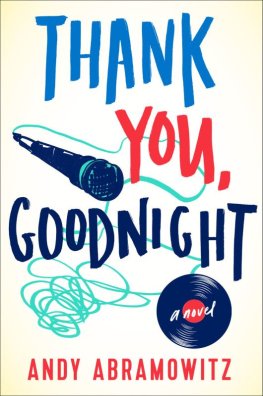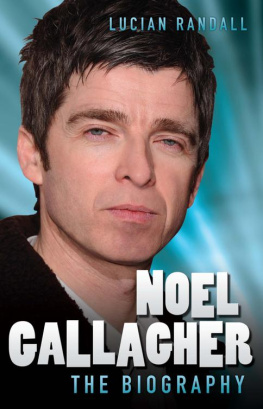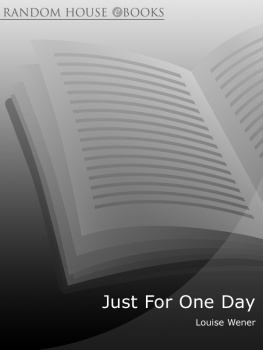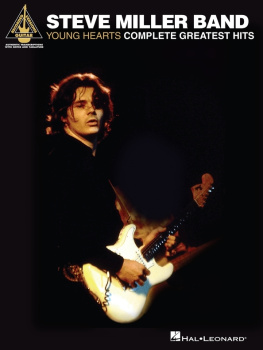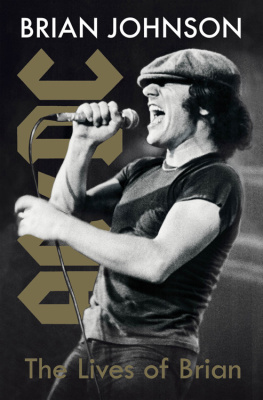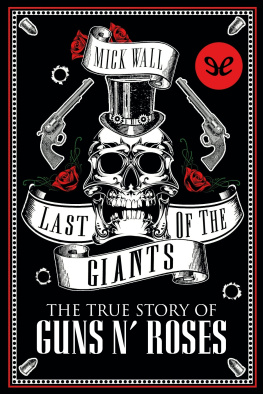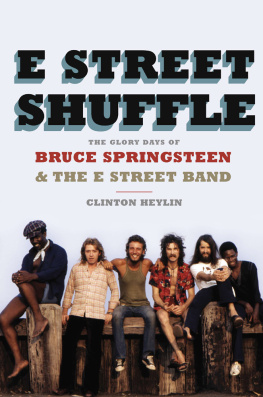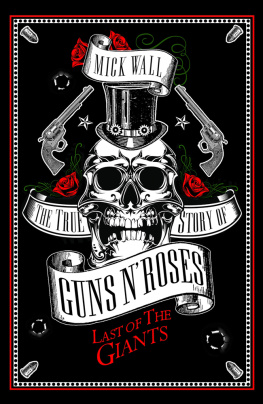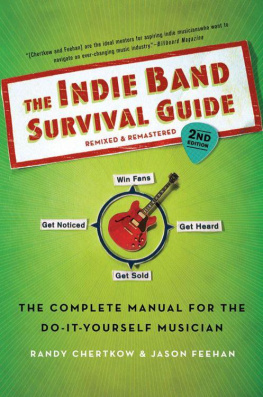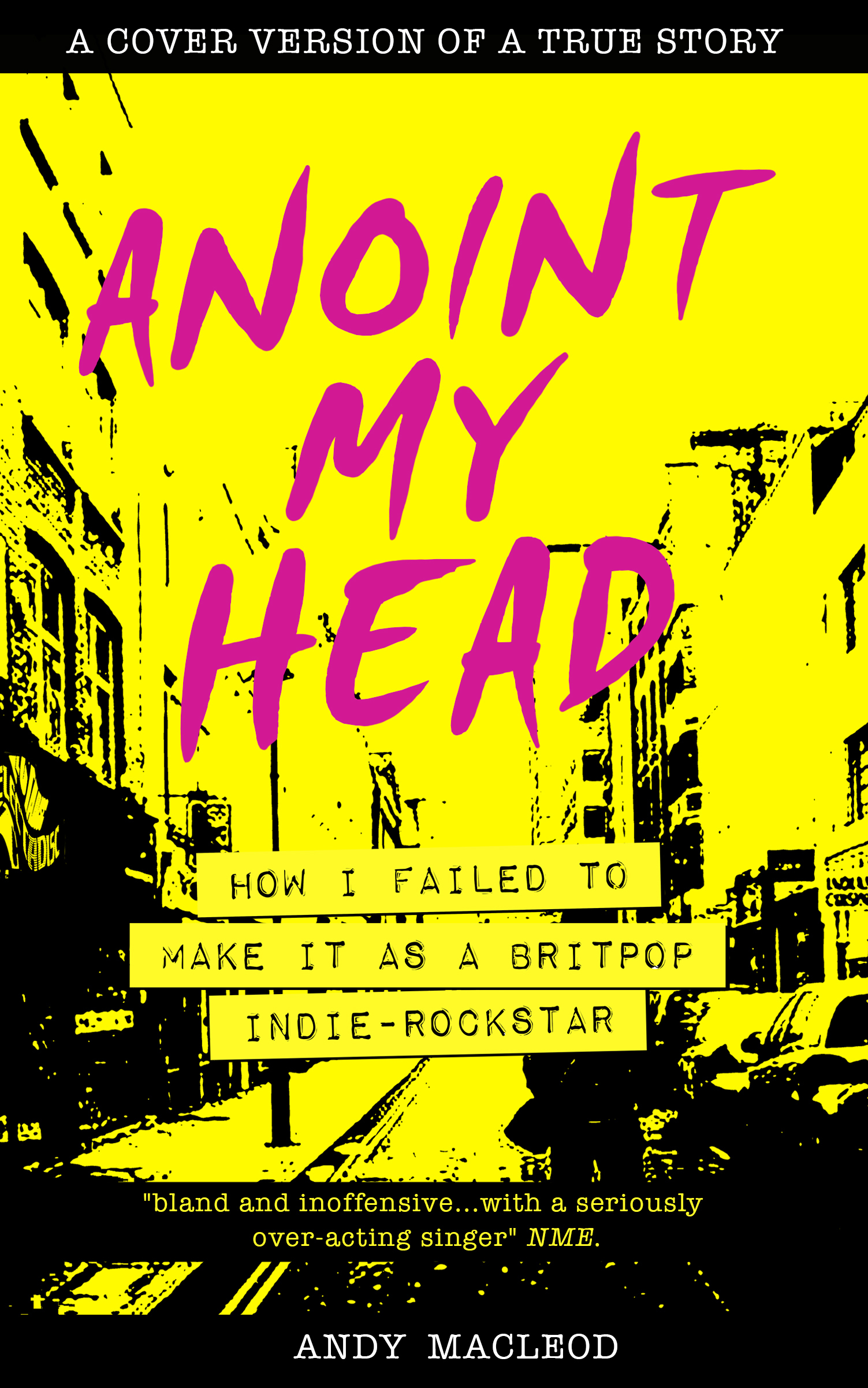Andy Macleod
Anoint My Head
How I Failed to Make it as a Britpop Indie Rockstar
First published by Pointy Books 2020
Copyright 2020 by Andy Macleod
All rights reserved. No part of this publication may be reproduced, stored or transmitted in any form or by any means, electronic, mechanical, photocopying, recording, scanning, or otherwise without written permission from the publisher. It is illegal to copy this book, post it to a website, or distribute it by any other means without permission.
Andy Macleod asserts the moral right to be identified as the author of this work.
This memoir is entirely a work of fiction. The names, characters and incidents portrayed in it are the work of the authors imagination. Any resemblance to actual persons, living or dead, events or localities is entirely coincidental.
First edition
ISBN: 978-1-8382719-4-7
This book was professionally typeset on Reedsy
Find out more at reedsy.com

For the birds
EXCLUSIVE SONG GIVEAWAY
The Pointy Birds - Benefit Office
Before we start the words, a few words.
Pointy Birds songs are not available anywhere in the world. You wont find them on Spotify, YouTube or Apple Music and they never made it on to vinyl or CD in the racks of Selectadisc or Tower Records. Their only existence is on a couple of fading cassette tapes, but now some of these rare creatures are daring to show their face. The first track to see the light of day is called Benefit Office. If you click below then these three minutes of perfect indie-pop pleasure can be all yours. Enjoy!
(But please forgive the out of tune harmonica.)
Sign up and send me Benefit Office
Prologue
Growing up in the UK during the seventies and eighties, bands were everywhere. The Beatles and The Stones had kicked things off the decade before, becoming the countrys proud export to the world. There must have been something in the water because the UK was bloody good at producing great bands - year after year after year. Band after band after band, producing hit after hit after hit. Not sure why. Population density? A British tendency for introspection? The combination of shitty weather and high quality electronics? Margaret Thatcher certainly helped provide something to kick against for inspiration. Maybe great art thrived in misery like the prettiest flower could bloom in manure. But whatever it was, bands were part of our heritage - we lived and breathed them, created sub-cultures around them. It was tribal - all-consuming. How could you not want to be part of the fun?
And this fun was encapsulated every Thursday night on BBC1 at 7:30pm on Top Of The Pops. To get there one had to live through the agony of Tomorrows World - boring grey men with thin lips and dry hair talking about dull inventions in the future yadda yadda yadda, who cared? I wanted to live in the present and Top Of The Pops was very much now. Even though I was tuning in to a party I wasnt invited to, on a beige carpet where I sat a few inches from the TV screen in our semi-detached house in the suburban commuter territory where we lived, that party looked a lot of fun. A vicarious thrill for my impressionable mind, another world where people seemed to have a good time all the time.
And it never let me down - from the disco and punk of the late 1970s to the new romantics of Human League and Visage and Soft Cell and ABC of the early eighties. Was your world expanded by Wham or Duran Duran? Or Spandau Ballet? Boys dressing like girls and girls dressing like boys. Uber pop stars like Adam Ant and Bros. The silliness of Madness and The Cure videos and songs that stubbornly stayed at number one for weeks. The Smiths gate-crashing the party in 1983 with a singer who had a hearing aid and a guitarist with a beehive haircut. Post-punk going mainstream with the likes of The Jam, The Clash, Dexys Midnight Runners, The Stranglers, Tears For Fears, Talk Talk, Simple Minds and U2. Band after band after band. Year after year after year, producing hit after hit after hit. Even Kid Creole and his bleeding Coconuts sent chills of excitement through me. As if it were meant for me, videos and songs soundtracking the ups and downs of growing up. What was this world of lunacy? The spell was half-broken when the camera occasionally and accidentally panned back to reveal a half-empty studio, but who cared. What would it be like on the stage performing and getting admiration, applause and adulation?
Increasingly I was becoming aware of a disconnect between the ordinary world I existed in and this technicolour other world that was beamed into our sitting rooms on TV each night. And it wasnt just bands I loved, it was films, TV, comedy - this whole world of fun, of play, of laughter. Even from the age of five, I was enthralled by the dancers in leotards that would star-jump and leapfrog across the stage at the start of Saturday night entertainment shows like Generation Game. And the crazy anarchic live television shows like Multi-Coloured Swap Shop, Saturday Superstore, Its A Knockout. (Maybe after years ravaged by war, Europe needed a TV show hosted by a laughing policeman with teams competing to throw wet sponges at giant chickens?)
One night as I entered my teenage years something profound happened. I was allowed to stay up late to watch a new comedy show called A Kick Up The Eighties. It wasnt particularly funny except for this one sketch with a daft private investigator from Birmingham called Kevin Turvey. Who was this person that seemed to jump out of the TV screen? His real name was Rik Mayall, and he was soon to appear again in a show that would make his name, playing his namesake Rik in a new BBC 2 sitcom The Young Ones. It was anarchic punk rock comedy, that featured a live band in each episode, and along with every other kid my age, I was riveted and learnt every line. With the launch of a fourth TV channel, aptly named Channel 4, he appeared again in The Comic Strip Presents Five Go Mad. Once again, he was brilliant with an intensity which meant he owned every scene. He didnt care what anyone thought and was having great fun, not caring.
As the eighties progressed, I became more and more seduced by the world of comedy. One Saturday afternoon, at the age of 13, my mate Tim and I got the bus to Tunbridge Wells to go to the cinema, and with the clever tactic of chewing gum to make us look older we got into an AA film (14+). The film was called Monty Pythons Life of Brian and I came out a changed person. I sat in open-mouthed awe throughout the whole film, fuelled by the excitement of being in an adult movie. I needed repeated viewings. I memorised every line, every scene. (Were all individuals. Im not!) And through the eighties, it kept coming - a series of films by US comic Steve Martin with the same zany anarchic silliness as Rik Mayall, the willingness to completely go for it and not care what people thought. The Jerk and The Man With Two Brains had me in stitches. Meanwhile the funniest film of all time was being made, the most elegant expression of music meeting comedy, This Is Spinal Tap.
It wasnt just that these films and TV shows were funny; it was more profound than that. How had these people done it? How had they made that happen with their life? There didnt seem to be a school lesson or a university which would teach you to be in a band or make funny films, but I knew for sure I wanted to do it. All these bands and comedians - Rik Mayall, Steve Martin, Michael Palin, Billy Connolly, John Cleese, Robert Smith, Jim Kerr were prime examples of those who had just gone for it, not caring. No data input. No filing records. No emptying bins. Growing up didnt have to mean an office job or being a desk slave. If they could do it, then why couldnt I?


